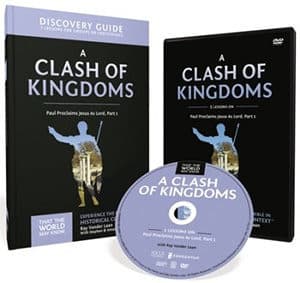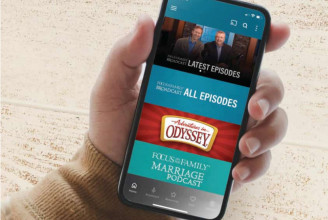Excerpt:
Mr. Ray Vander Laan: And God’s call, it seems to me, to Christians in the world today, wherever we live in our little Christian communities. We love our neighbors. We care for those who are in chaos. We put on display what God is like. We are a beachhead.
End of Excerpt
John Fuller: Ray Vander Laan was with us last time encouraging us to live passionately and authentically for Christ in a broken, hurting world. And he’s back again today with more encouragement to live out your faith vibrantly. I’m John Fuller and your host for Focus on the Family is author and Focus president, Jim Daly.
Jim Daly: You know, John, the Word of God is so deep and Ray Vander Laan, he loves to take us to that depth of Scripture. Sometimes as Christians we can live, kind of, in that shallow end where we don’t deepen our faith the way it should be. Uh, God’s heart is for us and He wants that kind of relationship with us. Uh, Ray is the founder of That the World May Know Ministries and we partner with them to produce the DVD series That the World May Know. I’m sure some of you have seen at least one of those DVD episodes. Today we’re going to look at Paul’s second missionary drawing from the content in Set 15 of that DVD series.
John: It is called “A Clash of Kingdoms” and we have that here at Focus on the Family. Just call 800, the letter A and the word FAMILY. Now Ray Vander Laan is a Bible teacher at Holland Christian schools in Holland, Michigan. He leads Bible related tours to the holy land, and he is a phenomenal guest. Let’s go ahead and join now the second part of the conversation with Ray on today’s episode of Focus on the Family.
Jim: Ray, welcome back.
Ray: Thank you. It’s great to be here.
Jim: Okay, everybody, let’s put on our seat belts (laughter), ‘cause you’re gonna be sitting in a class, basically, that RVL, which we affectionately call Ray. Um, pretend you’re sitting in his history class, his Biblical history class, back at Holland Christian School, and, uh, you are gonna learn so much, and I’m excited to get to it. Ray, we ended last time with Paul and Silas in jail, and how the Lord brought that earthquake, broke it open. People were free to leave, but they chose not to. And they honored the jailer in that way. Paul then goes with the jailer to his entire household, preaches the gospel. They become Christian, and he teaches the jailer what it means overnight. Ends up back at jail the next morning (chuckling) to make sure the jailer’s not harmed by the Romans for not doing his duty. A fascinating application to us about what it means to engage the culture, how we put others first, I mean the Scripture does say, “Love your neighbor as yourself.” That’s kind of a demonstration of that – what Paul was doing for that jailer, wasn’t it?
Ray: It was, absolutely. And the result at the end is, you now have a household – we have no idea how many. Could’ve been a dozen or more. A household that follows Jesus. So, here in this dark city that knew little of God’s shalom, there’s a little community of people who are living, who are putting the Jesus way on display to their neighbors.
The story ends with Paul going to the house of someone named Lydia, after this jail moment, and greeting the believers. Maybe the jailer was there, too, and then heading on to go to the next stop down the road.
That Lydia story actually precedes the jail story, and there’s a little background to that. It makes a profound point for who we are, as well, in the 21st century as followers of Jesus. Paul came to a Roman colony as a Roman citizen. We noted he didn’t use his citizenship right away, and the Bible says, when he got there, he went down to the river expecting to find a place of prayer, where Jews would be. Now think about that for a moment. That meant there was a Jewish community in Philippi already present before Paul got there. Who, apparently, were living out their faith enough, that they had begun to attract pagan Romans, because in the group that’s praying is a Gentile woman, a wealthy woman, a dealer in purple, named Lydia.
Ray: And so, she was worshipping with the Jews. Now think about that, how God had been drawing this woman, not by Christians, but by Jews who were there before the Christian message even got there. She was wealthy, as you would expect, because by this time, purple was an imperial color. And you weren’t permitted to wear that in just any situation. So, she had to have some interaction with the imperial household, with Caesar’s household.
Anyway, Paul came and he prayed with that group of people praying down by the river and then he shared Jesus with them, and Lydia believed and accepted Jesus, along with whatever Jewish understanding she had before that. And her house, she said, “Now you come to my house. I insist.” And her house becomes the meeting place for the new believers.
Now, I want you to think about something. This blew my mind. I have to give Costas Calaveras, my … my Greek professor friend, the – all the credit for pointing this out to me. When he wrote his e-mail to these believers – we call it the – the epistle to the Philippians. He said, “our citizenship as believers is in heaven.”
Now think about that. In Philippi, every other citizen said, “Our citizenship is in Rome. We’re a Roman colony. We’re here to show you what Rome is like. We’re here to show you all the benefits of being Roman.” And Paul says, “No, our citizenship is in heaven. We are a little colony of people meeting in Lydia’s house and the jailer’s house, living as if we were in heaven already.”
Jim: Yeah.
Ray: We love each other. We love our neighbors. We care for those who are in chaos. We put on display what God is like. We are a beachhead. And God’s call, it seems to me, to Christians in the world today, wherever we live in our little Christian communities, is not insulation and isolation, but to say, “Our citizenship is in heaven. You want a taste? Oh, it’ll be much more glorious, obviously. Sin’s still here. But you want a taste of what heaven’s like? Come and meet with our colony.”
Jim: That is good.
Ray: Isn’t that amazing?
Jim: That is so good.
Ray: So, and – and I want to say this, and I – I take this absolutely the right way. It has been such a privilege for me to work with Focus on the Family all these years, because as I look at your ministry, I like to think of your ministry as a colony-building ministry.
Jim: Mm.
Ray: You are training people how to live more like they’re a colony of heaven, in the marriages, in their parenting, in – in everything they do. You want people to follow Jesus and, in a sense, you’re helping to shape that colony that God can use to draw our culture.
John: And Ray, I’m tracking with you. I – I mean, you have made this such a – a winsome message, but I’m thinking, I’m gonna go home and tomorrow, I’m gonna wake up, and I’m not gonna have your words ringing in my ears quite as much as I have today. So, how am I gonna push through tomorrow’s busyness and the challenges and the frictions…
Ray: And that’s a good…
John: …To apply this?
Ray: …That’s a great question. That’s for each of us as followers of Jesus, is always the question. Um, two things come to my mind, not so much answers, but reflections. One is, it only works in community. I can’t do this either by myself. I – I just don’t have the stamina. I don’t have the commitment to stay after it. I’m too easily distracted, and get back into my – supplying my own – providing for my own needs, and I’m not so concerned about how I may be a message to others. So, I think, you need community. Don’t go alone. You won’t remain a disciple of Jesus if you are today, if you’re out there alone. I think that’s huge.
And if you think about this Philippi letter, Paul left Philippi, not with 25 believers each in their own little world. He left with at least two colonies – the jailer’s and Lydia’s. So, there was a community of people that could hold each other accountable, and that has made a huge difference in my own life.
Jim: And that may be a big difference from modern world…
Ray: True.
Jim: …From the ancient world…
Ray: Yeah.
Jim: …Is that accountability.
Ray: Good point.
Jim: We – we hide a lot easier today, even though we have so much more access to things. We hide more successfully in our heart…
Ray: Amen.
Jim: …And that’s a danger. I think everybody needs accountability of some sort.
Ray: Too many of our friends are Internet friends, not real. (Laughter)
Jim: Before – they – exactly, right. We “unfriend” them. We “best-friend” them, whatever. (Chuckling) But, um, RVL, let me ask you this. Before we move to Thessalonica, which we – we are gonna hit, um, that comparison with Rome, if you like history, and you’re listening right now, I’m there. I love history, so I’m always thinking, God, how does the U.S., how does Canada, how do states today, how do they apply to the Roman Empire?
When you were talking about all those set-ups about Rome, I’m thinking, boy, you could be saying that about the U.S.
Ray: Mm hmm.
Jim: Look at our grandeur. Look at our freedoms. Look at the democracy that we promote around the world. In many ways, we are that – that kingdom, the U.S. It’s the superpower.
Ray: Mm hmm.
Jim: How do we compare government? I mean, they’re not a pure democracy or a republic, the way we know it today, back in the Roman times.
Ray: Mm hmm.
Jim: How do we make the reference to today’s U.S. government and the Roman Empire?
Ray: And that question has run – run through my head 1,000 times as we put this together, particularly in the season we live in. Um , a couple of things. One, I’ve tried really hard not to make this a political message. Paul didn’t. All the opportunities he had to attack the empire and the emperor for all of its – I mean, it was horrendous how brutal it was in some ways. And he never did.
What he did is, he proclaimed Jesus. But as you’re – as you’re saying, when you proclaim and live Jesus, you critique the culture around you without saying a word. That’s really the Thessalonica lesson, is how Paul spoke the truth about Jesus, and it instantly critiqued their world.
What I say to people about our own country is, we do have an advantage on the Roman situation, and that is, our origins come out of a Christian worldview.
Jim: Right.
Ray: But we have to be really careful that we don’t identify our particular country as God’s Christian community. We have large Christian communities. We have wonderful Christian, uh, elements to our democracy, but it’s the church that is the people of God. And that’s an important thing. So, we are proud to be American, or Canadian. We support our country. We stand up for our country. We may even serve in the service to defend our country, but we do so as Christians. Paul was a Christian first and a Roman second.
Jim: Right.
Ray: I think that’s really an important distinction. That’s why he doesn’t use his citizenship, when it would’ve gotten him out of jail, because he has an ulterior motive. We wants to reach people, not because he’s a Roman, but because he’s a follower of Jesus.
Jim: Well, and that could stir a lot of hearts, because I know there’s great passion in that area the – of – of politics. And certainly, administrations and people lobby for power. You know, we want certain things. Here at Focus, we want life to be honored again.
Ray: Mm hmm. Amen.
Jim: We would love to see Roe v. Wade overturned. We would love to see marriage honored as God designed it, and all those things. But there is a reality that culture – we cannot control culture.
Ray: Mm hmm.
Jim: But we should be able to do better at our behavior, and that’s what you’re saying.
Ray: And we need to be righteous, politically. So, I’m strongly in favor of using whatever political opportunity we have to bring about righteousness, but that must never, ever replace being a living example of what we’re talking about.
Jim: Always have the…
Ray: And I think that’s…
Jim: …Character of Christ.
Ray: Exactly.
Jim: Right.
Ray: That’s where I fear sometimes, we lose track. We speak truth. We argue for righteousness, but we don’t necessarily live as an example of what that looks like in our own lives, in our own community.
Jim: Boy, and that really undercuts the gospel. We’re kinda describing modern times, but this is Thessalonica, as well, so let’s move to Thessalonica. Give us the backdrop, uh, Paul and Silas are leaving Philippi. They move now toward Thessalonica. What do you think is in their mind about that goal?
Ray: Mm hmm, that’s a good question, as well, as you look at the sequence of what happened. One of the things you should note, as you look at the Philippi story in the book of Philippians, is that Paul – Paul’s enemy, like Jesus’ enemy was not an evil empire. Jesus’ enemy wasn’t Herod. It wasn’t Pilate. It wasn’t the emperor. His enemy was the Evil One.
And Paul does the same thing. He doesn’t see Rome as his enemy. He doesn’t see – for all its immorality, he realizes that the greater enemy is the Evil One. However, the Evil One often seduces others, and even whole institutions to being his instruments. And in that sense, Rome was that in some ways.
So, Paul leaves, apparently happy. Leaves behind at least two colonies, if we can use that term, and he goes down the road about 100 miles to the next major city of Thessalonica. The history of Thessalonica is interesting, and this is going to get Paul into a confrontation much more directly with Imperial Rome, not with Roman custom, like those slave owners who were angry because they lost their income, but this time, Imperial Rome. But he does it, not by attacking Rome. Let me show you.
So, Paul came to Thessalonica. Went first to the Jews in the synagogue like he always does, and God-fearers there, as well. And he began to teach about Jesus.
He didn’t address the Emperor, but the language he used was language that the imperial Romans used, as well. So, he came with the gospel, but in Rome, gospel was an – an official term for a message about a new emperor or an emperor’s victory or an emperor’s coronation. So, when I say, “I bring you the gospel,” the Thessalonican would’ve said, “Oh, you mean about Caesar?” “No, about Jesus.” “There’s another gospel?”
Jim: Right.
Ray: That implies – or Paul talks about Jesus is the Savior of the world. That shows up on many of Caesar’s coins. He was the Savior of the world. “Save” means he defeated our enemies. He brought us peace and prosperity. Paul came to say, Jesus is the Savior of the world. It says that in Thessalonians. And they said, “Savior of the world? You mean Caesar, right?” “No, Jesus.”
Paul talks about Jesus is Lord. He uses that 43 times in the two books of the Thessalonians. “Lord” was an official title for the emperor. Where we might say, “Mr. President,” you said, “Lord.” So, when Paul came and said, “I want to bring you the gospel, the good news, that Jesus, Savior of the world is Lord.” People said, “Caesar, right?” “No, Jesus.”
And he does that with the word “peace,” as well. Often, on Roman inscriptions, it will talk about the peace of Rome, pax Romana, which Caesar is credited for bringing. “I will bring you,” he says, “peace and security.” There’s an altar at – at Preneste that I love to look at, ‘cause on one side it says, “Peace,” and on the other side it says “Security,” and it’s an imperial altar to make an offering to divine Caesar.
Paul comes and in his letter to the Thessalonians said, “When you hear them say peace and security, then watch out, because what comes is sudden destruction.” In other words, when you speak and live for Jesus, you will always critique the culture around you.
Jim: Right.
Ray: And Paul didn’t criticize the emperor. Paul didn’t criticize Rome, at least not anywhere in the Bible. And yet, he stirred up such a riot that they dragged him again into the agora, and they said – or they dragged his followers into the agora and said, “He’s claiming there’s another king besides Caesar named Jesus.”
Jim: Right.
Ray: I want my life to do that. I want my life to be lived in such a way that people around me say, “He’s got a different King than we do. He’s got a different loyalty than we do. He’s got a commitment to a different authority than we do.” And so, Paul’s confrontation with Imperial Rome was not a critique, a criticism of the political structures of his day. Paul’s engagement was to speak and live the truth, and it became a living critique of the culture around him.
And that again, you know, for the Focus on the Family listener, for the follower of Jesus, is the risk we Christians are always going to take. If we persistently and consistently live for Jesus, our life will always critique the unrighteousness of the culture in which we live. I don’t care what the culture is.
Jim: And RVL, I – I want to clarify this, ‘cause it’s such a great teaching point when you look at the history of Scripture and what the New Testament was referring to. When you say living that life and being an illustration of bringing God’s peace into this chaotic world, when you’re living that, it will self-critique. You don’t have to go out of your way to be hated is my point.
Ray: You don’t.
Jim: You don’t have to have to go up to a sinner and wag a finger in their face and say, “Look what you’re doing.” You don’t really – you don’t see that illustrated. You see – what I see as a calm response from the disciples, from the Lord Himself when He walked on this earth, appealing to that person and where they’re at today, the woman at the well.
Ray: Mm hmm.
Jim: “It’s true. You’ve been with five men.” But it wasn’t a finger wagging. At least you don’t get that sense. The Lord was appealing to her heart.
Ray: Amen.
Jim: You’re in pain. You’re in chaos. Let me tell you a way out, and that’s in a relationship with Jesus Christ.
Ray: Amen.
Jim: It’s not an aggressive stance. It’s different, but speak to the person who believes that culture war is the end game. This is how we retrieve everything. This is how we re-establish Rome (chuckling) in the American context, and how that may be a dead end.
Ray: You know, it brings me back in my mind to what we started with on the previous broadcast. When chaos came to God’s shalom, He decided to reclaim His broken world using human partners. And He asked His human partners to be the message, to be a living example of what shalom looks like. Be a light. Be witnesses. Make My name known. Be the bearer of My presence. Be a kingdom of priests that show the world what I’m like.
And never throughout the scriptural story do I hear God saying, “Go to your culture and condemn them.” Or “Criticize them in a cruel and unrighteous way.” Rather, live out the alternative. Now that will always engender a reaction. It’s gonna get us persecuted. It’s gonna get us slandered. It’s gonna get us disliked. Some people will believe. Many will choose to be – feel criticized. But the criticism has to be because we live the alternative, not because we’re judgmental.
Jim: Right.
Ray: And we have to be the message, and if I’m a non-believer, a judgmental, critical person is not gonna convince me that, that’s what shalom looks like.
Jim: And RVL, um, in Thessalonians, that’s where Paul crafts that beautiful message about putting on the armor of God.
Ray: Mm hmm.
Jim: Now of course, if you’re a warrior, that sounds great. The armor of God. I’m gonna take that spear and throw it right through that bad person’s heart.
Ray: Mm hmm.
Jim: That’s not what he’s saying
Ray: No.
Jim: The armor of God is spiritually defined.
Ray: Right.
Jim: Take us through that path.
Ray: Well, and that’s interesting in Thessalonica, because Thessalonica was the city that Alexander set out from to conquer the whole world. So, it had this proud militaristic attitude about it. And Paul makes a reference in Thessalonians, as well, to the armor of God, not to the detail he does in Ephesus.
But if you think about it, the breastplate of righteousness, it’s the – the – the sandals of shalom…
Jim: Peace.
Ray: …My walk. I – I say to my students and I hope that you take this the right way. I think many of us as Christians are streakers. We want the helmet of salvation, but the rest of the stuff…
Jim: That’s a good way to look at that.
(LAUGHTER)
Ray: …Is too much work.
Jim: Right.
Ray: So, if I’m saved, why do all the work to get the breastplate of righteousness? That’s hard and constant work. But the thing that rings so powerfully to me is Paul ends it by saying, “Oh, and your sword – your sword is the Word of God.” The weapon we wield, in a godly way, of course, is the Bible.
Jim: Right, it’s not anger. It’s not retribution.
Ray: It’s not anger. It’s – exactly. We need to speak the words of God.
Jim: In truth. Now here’s the observation. Uh, it is easier to speak things than it is to do things.
Ray: Mm hmm.
Jim: That’s the bottom line. And we human beings, if we’re honest, we’re kinda lazy. You know, we want comfort. We want leisure. That was very true of the Romans. This is where the analogy is really close. That’s true of the Roman and the Greek Hellenistic worldview, right?
Ray: Power, pleasure, leisure.
Jim: Right, power, pleasure, leisure. Man, that cuts pretty close to us…
Ray: Amen.
Jim: …Today, RVL. I mean, that’s us today, too. We want the Jacuzzi.
Ray: Amen.
Jim: And, uh …
Ray: I – I would just invite any listener to take a look at what we did with Paul at Philippi and Thessalonica, because if there ever was a hero who passionately lived every single moment to put God on display, it’s Paul in Macedonia. It’s amazing.
Jim: Well, it’s great. And this is what you’re going to learn in the new release of That The World May Know Set 15. And I’m telling you, uh, it’s this is meat. You know, Paul talks about the milk of the Word (Chuckling) and the meat of the Word. This is the meat of the Word and beginning to connect these dots. Um, RVL, for that person that may not understand the metaphors. Um, they’re new to the faith or maybe they just haven’t gone any deeper in the faith. They don’t understand sheeps and goats and some of the things that the Scripture is describing. They want to. What would you say to them in terms of deepening their understanding, as a teacher?
Ray: I think there’s a number of things I would encourage them to do. One is always be a person of the Word and be always willing to ask the question of why is it said that way? Why “green pastures?” Why is God “living water?” Why is He the “living bread?” Ask the question. Two, be part of a community where there are in that community others with, shall we say, more experience in reading the Bible, contextually. Because it’s the context that supplies the background to why a certain metaphor works and why another doesn’t.
And I like to encourage people to say, don’t be embarrassed about your own lack. I – I said to a Jewish person once, “How in the world am I ever gonna know as much about this as you do?” And he kinda looked at me funny, and he said, “No one asks you – God doesn’t ask you,” he said, “to know as much as I do. God asks you, do you know one more thing today than you did yesterday?”
Jim: Huh.
Ray: And I think that’s such a great way to go through life. I don’t ever want to arrive and say, “Well, I’ve figured out some of these metaphors, so I don’t need to know.” I want to wake up in the morning and say, “I wonder why it’s said that way?” And then, maybe by the end of that day I can know one more thing about the truth of God’s Word than I did yesterday
John: Well, you can certainly expand and enrich your own understanding of the Scripture and the context of various passages when you get a copy of That the World May Know Set 15. You’ve heard Ray share very passionately about some of the truth lessons in that DVD, and we encourage you to request that when you get in touch. Our number is 800-A-FAMILY. 800, the letter A and the word FAMILY. And online we’re at focusonthefamily.com/broadcast.
Jim: And we should mention, John, that people are calling us asking for help in these very difficult days. They need encouragement. And you can help us to bring God’s shalom to those who are hurting by sending a gift and partnering with us in ministry. And with a gift of any amount, we’ll thank you by sending a copy of DVD Set 15 from That the World May Know. It’s called “A Clash of Kingdoms,” along with a study guide. Also, don’t forget that when you send a gift today, your gift will be doubled because of some generous supporters here at Focus on the Family. They will match your donation, dollar for dollar, so please respond today.
John: And Jim, we’re going to wrap up today with a closing thought from Ray. You had asked him about the rejection or negative reaction that we might receive when we live out our faith in Christ in our communities.
Ray: Yeah, they – the way I think, Rabbi Jonathan Sacks said it on a lecture I heard him give, is that a life lived, a righteous life – and I’m not quoting, I’m paraphrasing – but a righteous life will always critique an unrighteous life. And so, if I’m living my faith it will always be heard as a critique of someone who lives by a different worldview.
John: Mm.
Ray: So, I always worry when I’m not facing opposition. I always wonder if maybe it’s because I’m not living my faith that distinctly that other’s feel critiqued. And I don’t mean “critique” in a critical, cruel judgmental way. I mean, if I live righteously in my marriage, the neighbor down the street, who may be living an alternative way in marriage, will feel critiqued.
Jim: Mm hmm.
Ray: Not because I judged him or her or criticized him or her, but because my very life speaks to what I believe. And I think that’s so important. You know, and this may not be the time or place, but people talk about opposition and persecution in the United States. And after reading these stories of Paul in Philippi and other places, I would never call what I have to face “persecution.”
Jim: No.
Ray: It’s not. I face some opposition. I face sometimes criticism and slander, but if I do that because my life is – I’m trying to live my life faithfully before God, I think that’s what He calls us to do.
John: Well, our thanks again to Ray Vander Laan for joining us today on Focus on the Family. And, again, if you have any questions about the resources including That the World May Know, just give us a call. 800, the letter A and the word FAMILY. On behalf of Jim Daly and the entire team, thanks for joining us today for Focus on the Family. I’m John Fuller, inviting you back as we once again help you and your family thrive in Christ.




















